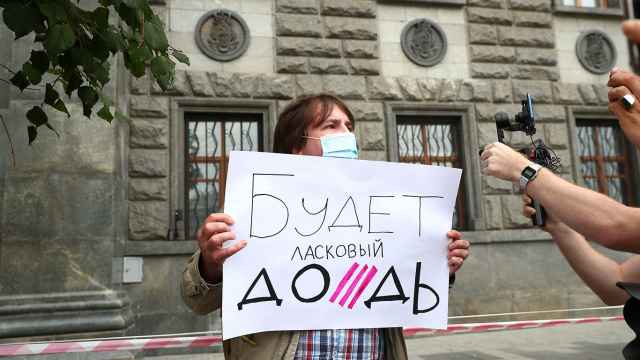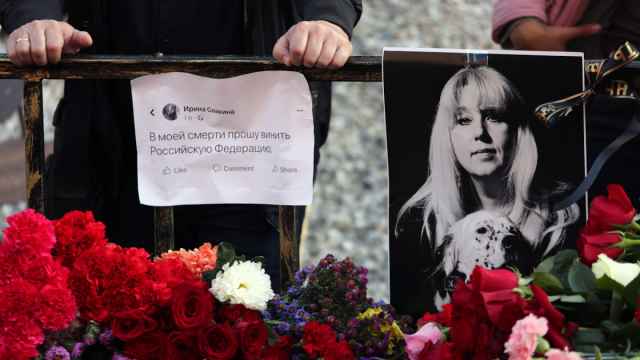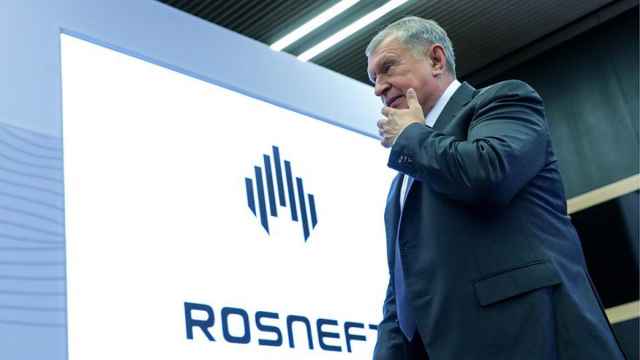The arrest of investigative journalist Ivan Golunov in Moscow marks an important inflection point in relations between President Vladimir Putin’s regime and Russia’s various elites.
The Kremlin, initially blindsided by the outcry at the reporter’s detention, could end up benefiting from it all, and the more liberal part of the pro-regime establishment may gain an advantage over its overeager security apparatus.
Golunov is an unlikely central figure for such a potentially momentous story. Until June 7, he wasn’t well-known outside Moscow’s journalistic circles. The self-effacing 36-year-old was, however, highly respected by colleagues — not least because of his ability to pull on a thread nearly invisible to others and spin it out into a stunningly thorough investigation.
Golunov possesses that rare combination of pedantry and fearlessness that makes the perfect investigative journalist. He applied his skills to subjects few others dared approach: The landfill business, dominated by mobsters and connected oligarchs; the cemetery mafias; the loan sharks; Moscow’s city government. (Meduza, the Riga-based outfit for which Golunov had recently worked, has published some samples of his reporting in English.)
None of Golunov’s investigations were expressly political. They dealt with the minutiae of a society based on an amalgam of organized crime, mid-level bureaucracy and corrupt law enforcement. It wasn’t his job to discuss this system’s origins or its beneficiaries and benefactors in the Kremlin. He dug and analyzed; he didn’t editorialize.
On Thursday, he filed a long-awaited story on the Moscow funeral business which implicated a number of law enforcement officials, including some officers in the FSB secret police, in running a protection racket. Then he went out to meet another reporter. On his way, he was picked up by plainclothes police, searched, shown a bag of white powder purportedly found in his backpack, stuffed into a car and taken to his Moscow apartment.
A warrantless search of his home turned up more bags of powder. He was taken into custody, roughed up (though very slightly by Russian standards) and told he was being charged with possessing drugs with intention to supply. Only at 3:30 on Friday morning did the cops call one of Golunov’s friends, another investigative journalist, to say he had been detained.
I have known Golunov for a long time and was, at one point, his editor. I had never heard of him using, much less selling, any drugs (and editors in Russia have long made it their business to find out about such staff-related risks.) When I worked with him, he didn’t even drink alcohol. He was a stickler for the rules, acutely aware of the caution a person in his trade must exercise. Besides, he had no taste for luxury and little use for money; he ran on intense curiosity. To me, and to everyone else who knew him, the charges looked preposterous.
There could be no doubt that the drugs had been planted, and that Golunov was being targeted for his work.
In Russia, it’s very hard to mount a successful defense to such charges. The country’s harsh drug laws set low thresholds on the amount of a controlled substance it is a felony to possess. Fabricated charges are routinely used as a weapon against inconvenient individuals.
Golunov’s case turned out to be special, though. For Moscow journalists, already facing harsh restrictions on their work in addition to much economic pressure, not standing up for him was unthinkable. It’s not just that many knew him as I did and found the charges impossible to believe; anyone could be next in line.
The ensuing protest was both impossible to miss — and curiously cautious. Many news outlets effectively boycotted coverage of the St. Petersburg Economic Forum, traditionally Putin’s favorite international event of the year. On Friday, the event was meant to be a demonstration of Putin’s close friendship with Chinese President Xi Jinping. Golunov beat Putin in both social media and traditional media mentions. Journalists stood in a disciplined line in front of Moscow’s police headquarters, waiting their turn to hold a sign demanding his freedom. Under Russian law, it’s an offense to hold a rally without permission, but single-person pickets are allowed without prior notification.
Initially, the Kremlin took a tough line. Putin’s press secretary Dmitry Peskov pointed to a series of police photographs suggesting Golunov had run a drug lab at his modest apartment. It later transpired that the pictures had been taken elsewhere.
The Russian Foreign Ministry, for its part, responded to tweets in Golunov’s defense from various U.S. and European officials by saying they should instead worry about WikiLeaks founder Julian Assange.
But as early as Friday, some propagandists for the Russian regime began showing an unusual degree of sympathy for the investigative journalist. Tina Kandelaki, TV personality and head of a state-owned sports channel, posted on Telegram that she didn’t believe the charges against Golunov. Margarita Simonyan, editor-in-chief of the propaganda channel RT, declared that the authorities must answer “very, very, VERY many questions” about the reporter’s case.
It was obvious early on to these experienced propagandists that the Kremlin was losing points because of the arrest, which somebody much lower down the food chain must have engineered. Putin, after all, makes a show of being intolerant of corruption, and officials, especially regional ones, are often charged with graft and given long prison sentences. Since Golunov isn’t an opposition figure, the Kremlin had little to gain by affirming the charges and keeping him locked up; instead, it had a chance to lash out at corrupt law enforcement officials and win popularity points.
Late on Friday night, a judge placed Golunov under house arrest — an all but unprecedented act of leniency for someone charged with a drug offense carrying a minimum 10-year jail term. But journalists continued protesting: For an innocent person, any kind of confinement is too harsh.
On Monday, Russia’s three top business newspapers, Vedomosti, Kommersant and RBC carried identical front pages for the first time in their fiercely competitive history, each proclaiming “We Are Ivan Golunov.” They also carried a cautious joint statement that they “didn’t rule out” that Golunov (who had worked for two of the three publications) was being pursued for his work.
But by then, outrage on behalf of the mistreated reporter clearly had been officially sanctioned. Journalists at the two main state television channels, who never say anything without permission, demanded that “conclusive proof” of Golunov’s crimes be presented or he be freed immediately.
Also on Monday, Putin’s human rights ombudswoman, Tatyana Moskalkova, officially reported to Putin on the case. In her opinion, Golunov’s arrest “discredits the whole practice of investigating drug crimes.”
This tees up the ball nicely for Putin to hit before or during his annual call-in show with voters, scheduled for June 20. He faces a simple choice: Listen to his propagandists, let Golunov go and order reprisals against the corrupt cops – or side with his security apparatus and cover up the embarrassment with increased toughness.
The former is more likely: Putin is worried about a steep drop in his ratings and eager to show that he is happy to side with people who protest injustice — as long as they don’t demand his overthrow. So far, the protests have remained within the loyalist framework, and a good Czar has a chance to show magnanimity. That’s good for Golunov, and of course the Moscow journalists understand this. That’s why they have been so cautious in their public utterances.
If Putin holds up his thumb, I would be happy to see an honest, highly professional colleague walk free. At the same time, such a development would be a victory for the regime’s smooth spin doctors over its uncouth security elite. In the last few years, the latter has acted with increasing impunity, undermining the attempts by propagandists and establishment liberals to paint Putin’s Russia as a “normal” country. Golunov’s release could turn into a major talking point for these efforts — and, importantly, it would show dissidents that protest can be effective if it doesn’t turn too radical.
Russia, however, wouldn’t move any closer to normalcy. The attempt to domesticate protest is transparently disingenuous, and the enforcers will, of course, fight back, seeking both to prove their loyalty to Putin with more suppression and to line their pockets with a little more skill amid some unwelcome attention.
A Message from The Moscow Times:
Dear readers,
We are facing unprecedented challenges. Russia's Prosecutor General's Office has designated The Moscow Times as an "undesirable" organization, criminalizing our work and putting our staff at risk of prosecution. This follows our earlier unjust labeling as a "foreign agent."
These actions are direct attempts to silence independent journalism in Russia. The authorities claim our work "discredits the decisions of the Russian leadership." We see things differently: we strive to provide accurate, unbiased reporting on Russia.
We, the journalists of The Moscow Times, refuse to be silenced. But to continue our work, we need your help.
Your support, no matter how small, makes a world of difference. If you can, please support us monthly starting from just $2. It's quick to set up, and every contribution makes a significant impact.
By supporting The Moscow Times, you're defending open, independent journalism in the face of repression. Thank you for standing with us.
Remind me later.








